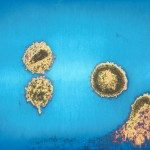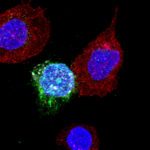Lien vers Pubmed [PMID] – 37058769
Lien DOI – 10.1016/j.ebiom.2023.104557
EBioMedicine 2023 Apr; 91(): 104557
CD8+ T cells equipped with a full arsenal of antiviral effector functions are critical for effective immune control of HIV-1. It has nonetheless remained unclear how best to elicit such potent cellular immune responses in the context of immunotherapy or vaccination. HIV-2 has been associated with milder disease manifestations and more commonly elicits functionally replete virus-specific CD8+ T cell responses compared with HIV-1. We aimed to learn from this immunological dichotomy and to develop informed strategies that could enhance the induction of robust CD8+ T cell responses against HIV-1.We developed an unbiased in vitro system to compare the de novo induction of antigen-specific CD8+ T cell responses after exposure to HIV-1 or HIV-2. The functional properties of primed CD8+ T cells were assessed using flow cytometry and molecular analyses of gene transcription.HIV-2 primed functionally optimal antigen-specific CD8+ T cells with enhanced survival properties more effectively than HIV-1. This superior induction process was dependent on type I interferons (IFNs) and could be mimicked via the adjuvant delivery of cyclic GMP-AMP (cGAMP), a known agonist of the stimulator of interferon genes (STING). CD8+ T cells elicited in the presence of cGAMP were polyfunctional and highly sensitive to antigen stimulation, even after priming from people living with HIV-1.HIV-2 primes CD8+ T cells with potent antiviral functionality by activating the cyclic GMP-AMP synthase (cGAS)/STING pathway, which results in the production of type I IFNs. This process may be amenable to therapeutic development via the use of cGAMP or other STING agonists to bolster CD8+ T cell-mediated immunity against HIV-1.This work was funded by INSERM, the Institut Curie, and the University of Bordeaux (Senior IdEx Chair) and by grants from Sidaction (17-1-AAE-11097, 17-1-FJC-11199, VIH2016126002, 20-2-AEQ-12822-2, and 22-2-AEQ-13411), the Agence Nationale de la Recherche sur le SIDA (ECTZ36691, ECTZ25472, ECTZ71745, and ECTZ118797), and the Fondation pour la Recherche Médicale (EQ U202103012774). D.A.P. was supported by a Wellcome Trust Senior Investigator Award (100326/Z/12/Z).







